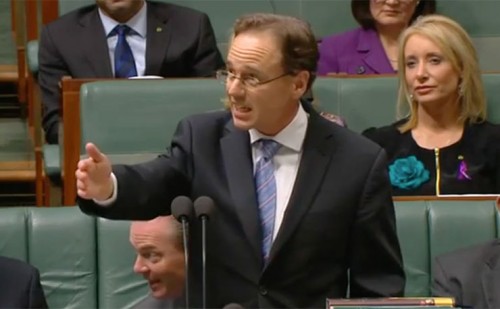Labor and the Greens have slammed what appears to be a second change of course for the government labelling the laws ‘short sighted’ and ‘unsophisticated’. Thom Mitchell reports.
Labor, the Greens, and conservation groups have trashed a Senate Inquiry’s report into Australia’s national environmental laws, arguing the recommended changes are “an attack on democracy and the rule of law” and that the government has shown “no respect” to the green groups it’s trying to curtail.
The Senate Inquiry had been due to report in February on the government proposed reforms designed to limit who can challenge the Environment Minister’s decisions, so the release of a final report this afternoon came as a surprise.
The government’s bill was a response to a successful legal action launched by the Mackay Conservation Group earlier this year, which appealed to the Federal Court to rescind Environment Minister Greg Hunt’s legally flawed approval of Indian firm Adani’s Carmichael coal mine, in Queensland’s Galilee Basin.
The mine would be the biggest Australia has ever seen, if it’s built, and create four times the carbon emissions of New Zealand each year once the coal is burnt.
In early August government solicitors conceded that Minister Hunt had failed to adhere to national environmental law when he approved the project last year because he did not consider conservation advice relating to two threatened species that will be impacted.
The then Prime Minister Tony Abbott, Attorney-General George Brandis, Hunt, and other segments of the Coalition government launched a vitriolic campaign against green groups which were accused of waging ‘lawfare’ to stall big developments.
Amendments to Australia’s main environmental law, the Environment Protection and Biodiversity Conservation Act, were soon in the offing.
The government sought to restrict the legal ‘standing’ of who could challenge environmental approvals, to freeze out conservation groups that might challenge developments like the Carmichael coal mine.
“The EPBC Act standing provisions were never intended to be extended and distorted for political purposes as is now occurring with the US style litigation campaign to ‘disrupt and delay key projects and infrastructure’ and ‘increase investor risk’,” Hunt told Parliament in late August.

In a dissenting report Labor rubbished the government’s arguments
“Labor Senators consider that the proposed [reform]cannot be described as anything but a very unsophisticated, and short-sighted, response to an administrative error made by the Government in the approval process for the Adani Carmichael coal mine,” the dissenting report reads.
“It was not an example of ‘lawfare’ or action by ‘vigilante’ litigants to disrupt and delay key infrastructure projects as the Government has constantly described it.
“Rather, the challenge brought by the Mackay Conservation Group was based on legitimate grounds.
“Labor Senators…consider that the evidence presented to the committee convincingly refutes the level of vexatious or frivolous litigation as a ground for the [reform to standing provisions].
“Of the 5,500 projects referred to the Department of the Environment for assessment since the EPBC Act came into force, around 0.4 per cent have been the subject of legal challenges.
“…As noted by Dr Chris McGrath, the Government did not provide any evidence of inappropriate litigation in the explanatory memorandum to the bill.”
In late 2009 a government commissions review of the EPBC Act also found that the current standing provisions had “created no difficulties and should be maintained”. The laws, including the provisions around standing, were introduced under the Howard government in the year 2000.
In a separate dissenting report from Environment Spokesperson Senator Larissa Waters, the Greens said “attacks on public enforcement rights are an attack on democracy and the rule of law. When the Coalition government and its big mining mates break the law, they change the rules”.
“This Bill is the latest in a long line of attacks by a government that cannot face criticism or dissent on independent voices for the environment,” the Greens’ dissenting report said.
“These attacks include including totally defunding EDOs, launching a witch hunt against tax deductible donations to environment groups, slashing funding to community conservation groups and trying to hand over federal environment power to State, Territory and local governments.”
According to Labor’s dissenting report, if the bill is indeed an effort to shut down dissent it’s unlikely to even work. The bill is ostensibly designed to restrict those who can challenge a decision to only parties ‘directly affected’ – a phrase widely taken to mean those within very close geographical proximity or with a financial interest in a project – but expert testimony suggested it would not do this.
In writing Labor’s dissenting report, Senators Anne Urquhart and Lisa Singh echoed earlier comments from an earlier Senate Committee in noting that “the limiting of standing to those directly affected by development projects fails to recognise the potentially far-reaching environmental effects of those projects”.
“Conservation groups, researchers and educators have an important role in safeguarding the interests of the Australian public generally. They are experts in their field, have great understanding of the consequences of environmental impacts and the ability to monitor these issues,” the Labor Senators wrote.
They accused the government of having “no respect” for those same people and organisations, suggesting the Coalition had “abrogated its responsibility to thoroughly scrutinise the bill” by cutting short the Committee’s reporting deadline, thereby preventing scheduled public hearings from going ahead.
The Chief Executive Officer of the Australian Conservation Foundation, Kelly O’Shanassy has levelled similar accusations in the wake of the report’s release.
“The vast majority of the 292 submissions to this inquiry – submissions from lawyers, scientists, health professionals, unions, environment groups and plenty of individual Australians – opposed any change to the law,” O’Shanassy said.
“The few submissions that advocated changing the law to restrict environment groups’ rights were unsurprisingly from groups that have a vested interest in profit-making from new coal mines, like the Business Council and the Minerals Council.
“Once again our government is doing the bidding of the big polluters, serving their interests over the interests of Australians who depend on a healthy environment.”
Donate To New Matilda
New Matilda is a small, independent media outlet. We survive through reader contributions, and never losing a lawsuit. If you got something from this article, giving something back helps us to continue speaking truth to power. Every little bit counts.





